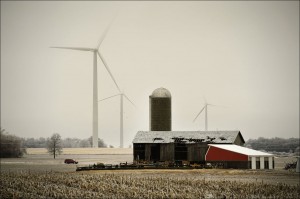Bill could boost wind farm lawsuits
By: Dan Shaw, [email protected]//April 11, 2013//

If a bill moving through the state Capitol becomes law, Dave Enz says he would be more likely to sue the owner of a wind farm he argues drove his wife and him away from their Brown County home.
State Sen. Frank Lasee, R-De Pere, is seeking co-sponsors for a bill that would prevent wind farm developers from citing government approval as a defense in lawsuits filed by residents who live within a mile and a half of a turbine. The bill also would let plaintiffs in such cases obtain compensation for loss of property value and for reasonable legal fees, among other things. Current law only allows them to recover $500 in legal fees in such cases.
Enz said he never consulted a lawyer about the possibility of suing the Shirley Wind Farm, which was built in 2010 and bought by Duke Energy Renewables the following year. The closest of the farm’s eight turbines is about 3,000 feet from Enz’s house, which he lived in for more than 30 years.
But without the assurance that the developer could not use the local government’s approval of the project as a defense, Enz said, he doubts he would be successful in court.
“It is needed to remove the insulation between the people who are hurt and the people who are causing the pain,” Enz said. “It puts the liability where it belongs, with the people who are creating the problem.”
Rob Kovach, Lasee’s staff specialist on wind farms, said the bill is needed to ensure plaintiffs have the legal standing and the wherewithal to take on wind developers, which he said have “deep pockets.”
But a law professor questioned the wisdom of making legal exceptions for suits against one particular industry. Richard Heymann, an adjunct law professor at the University of Wisconsin, said any time that happens, a precedent is set that politicians could later use merely to protect favored constituents or interests.
“It’s the thin edge of the wedge,” he said. “An unlimited people want exceptions to general rules. Sometimes it’s a good idea, but in the real world, the less often you do that the better off you are.”
Heymann said there are cases for which special exceptions are justifiable. An example is the strict-liability standard that applies to activities such as blasting in quarries.
Under that, blasters can be found liable for any harm they have caused to persons or property without a plaintiff having to prove negligence. Strict-liability standards, he said, often are applied to situations that are inherently hazardous.
Heymann questioned whether the alleged harm caused by wind farms rises to that height and whether the projects should instead be treated like other operations, such as pig farms, that commonly are sued for being nuisances. He said the legal theories guiding nuisance law has existed for hundreds of years.
“It’s a new twist here because you are dealing with wind farms and not pig farms,” he said.
But if wind turbines truly are a nuisance, “prove it and you will win your lawsuit.”
And if the government’s standards allow the operation of unsafe wind farms, he said, then government should change the standards.
Kovach said several attempts have been made toward that end in recent years, but with little success. Lasee, he said, is using another proposal, Senate Bill 71, this session to try to let local officials set stricter health and safety standards for wind farms than are required under state rules.
Until those battles are successful, though, victims’ best way to obtain redress is through lawsuits, he said.
“When a wind turbine is harming their home,” he said, “it harms them financially, and they should be able to receive damages for that.”
Another professor, meanwhile, questioned the need for Lasee’s bill. William Church, who teaches law at the University of Wisconsin, said government approval of a project rarely is a sufficient defense against a nuisance suit.
“It would be a factor,” he said. “But it wouldn’t insulate a windmill from a lawsuit.”
It’s common, he said, to see a company or other organization that has obtained government approvals still being accused of causing unreasonable harm to neighbors. If a mine, for instance, were built according to government standards and those living nearby were nonetheless severely injured, “they could still sue the mine and win,” he said.
Enz, a 70-year-old retired maintenance worker said the bill, if passed, might lead him to do just that. He said he has filed complaints to Duke Energy about the health troubles he blames on the Shirley Wind Farm.
To those, he said, he has received no answer except that the project conforms to local government regulations.
Tammie McGee, spokeswoman for Duke Energy, said the company responds to such complaints by noting that it has not found a single peer-review scientific study that links wind farms to health troubles.
“We look to science,” she said, “when we look for answers.”
To that, Kovach said, he can point to a stack of peer-reviewed studies that show the projects are harmful.
Enz said the only evidence he needs are his own health problems, which include blurred vision, headaches, nausea and ear pain. He said the symptoms manifested almost immediately when the Shirley Wind Farm began operating, lasted as long as the couple was at home, but ceased almost immediately when he and his wife went on vacation.
Tired of suffering, he said, they wife decided in early 2011 to make their separation from their house more or less permanent. Enz said they now are living in a motor home in Alabama.
He said he is not contemplating selling his house because he could not in good conscience do something that would cause someone else to live there and suffer as he has. In his circumstances, he said, a lawsuit is looking like a more attractive prospect, especially if government approval is removed as a defense.
“I think people need to be responsible for their actions,” he said. “And that would be a real plus for people, like myself, who have been driven from their homes.”
Legal News
- Wisconsin lawyers file University of Wisconsin public records request seeking answers to protests
- Wisconsin Supreme Court issues orders amending Supreme Court rules and Wis. Stats.
- EXCLUSIVE: Former Milwaukee ‘big law’ partner attacks news media for bias against Trump
- Former Milwaukee election official fined for obtaining fake absentee ballots
- Contract dispute prevents airing of 15 regional sports networks, impacts Brewers
- Wis. middle school focuses on recovery as authorities investigate shooting
- Gov. Evers seeks applicants for Sheboygan and Green County Sheriffs
- North Carolina man who harbored Nazi memorabilia and attacked Black and Latino men sentenced to 41 months
- Nation grieves with families of officers killed in NC
- Amended complaint filed in federal court against State Bar of Wisconsin seeks punitive damages
- United Healthcare suit against cancer drug distributor time-barred
- Trump’s Wisconsin visit warns of jail time if he violates a trial gag order
WLJ People
- Power 30 Personal Injury Attorneys – Russell Nicolet
- Power 30 Personal Injury Attorneys – Benjamin Nicolet
- Power 30 Personal Injury Attorneys – Dustin T. Woehl
- Power 30 Personal Injury Attorneys – Katherine Metzger
- Power 30 Personal Injury Attorneys – Joseph Ryan
- Power 30 Personal Injury Attorneys – James M. Ryan
- Power 30 Personal Injury Attorneys – Dana Wachs
- Power 30 Personal Injury Attorneys – Mark L. Thomsen
- Power 30 Personal Injury Attorneys – Matthew Lein
- Power 30 Personal Injury Attorneys – Jeffrey A. Pitman
- Power 30 Personal Injury Attorneys – William Pemberton
- Power 30 Personal Injury Attorneys – Howard S. Sicula











